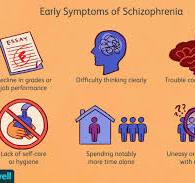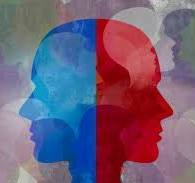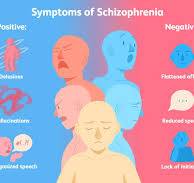
Schizophrenia is a mental disorder that affects how a person thinks, feels, and behaves. The symptoms of schizophrenia can be broadly classified into positive and negative symptom.
Positive symptoms are those that are not present in healthy individuals but are present in people with schizophrenia. These include delusions, hallucinations, disordered thinking, and disordered behavior

Negative symptoms are those that are absent in people with schizophrenia but are present in healthy individuals. These include flat affect, lack of emotional expression, lack of pleasure or interest in activities, lack of motivation to do anything, and decreased speech output2.
It is important to note that the symptoms of schizophrenia can vary from person to person and may change over time. If you or someone you know is experiencing new, severe, or persistent symptoms, it is important to contact a healthcare provide

The symptoms of schizophrenia can vary from person to person, but some of the most common symptoms include:
Hallucinations: Seeing, hearing, or feeling things that are not there.
Delusions: Believing in something that is not true.
Disordered thinking: Difficulty organizing thoughts or connecting them logically.
Disordered behavior: Acting in ways that are not normal or socially acceptable.
Flat affect: Lack of emotional expression.
Lack of pleasure or interest in activities: Losing interest in activities that were once enjoyable.
Lack of motivation to do anything: Losing the drive to do anything.
Decreased speech output: Speaking less than usual.
What is the difference between hallucinations and delusions?
How common is schizophrenia?
Can people with schizophrenia work or go to school?Top of FormBottom of Form
Elderly patients with dementia-related psychosis treated with antipsychotic drugs are at increased risk of death.
Cerebrovascular Adverse Events, Including Stroke:
Neuroleptic Malignant Syndrome (NMS
Tardive Dyskinesia (TD):
Metabolic Changes: Atypical antipsychotic drugs have caused metabolic changes including:
Hyperglycemia/Diabetes Mellitus
Dyslipidemia: Undesirable alterations in lipids have been observed in patients treated with atypical antipsychotics.
Weight Gain: Weight gain has been observed with atypical antipsychotic use. Clinical monitoring of weight is recommended.
Evidenced based studies shows that schizophrenia is a chronic mental illness that requires intensive medication and therapy for patients to maintain daily normal life,

AT BHPS, we focus on the best outcome for patients. Uses proven medical practices and therapy to improve our patient’s health conditions.
Call us today and find out how we can help improve your healthcare.

At BHPS, we thrive to restore our patients lost hope. We dedicate our services to uncovering and healing the unseen. We help our patients overcome mental health and medical health challenges.
©Copyright 2024. All Rights Reserved. Rometheme